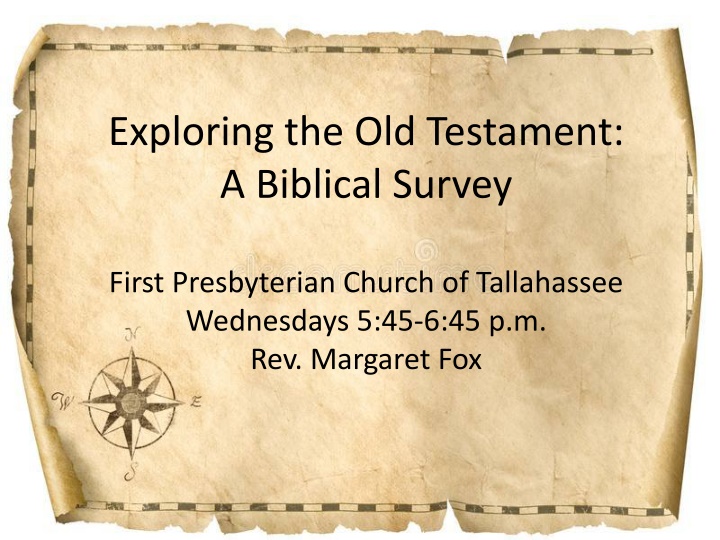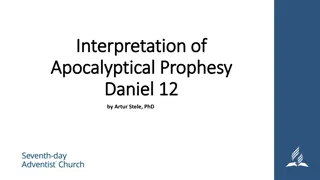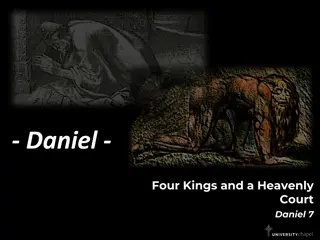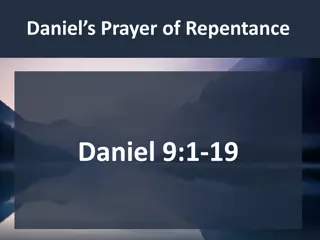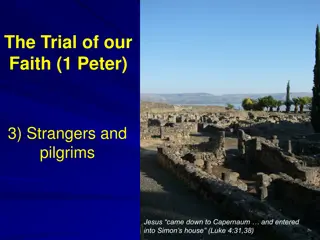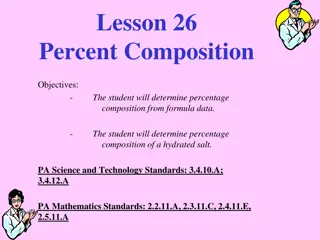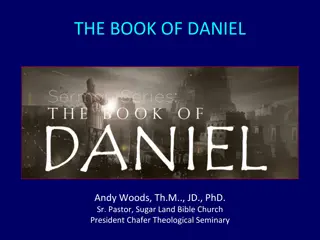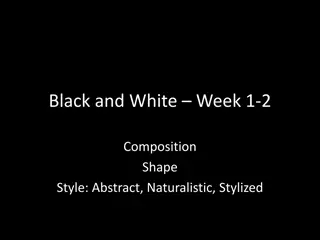Composition and Date of the Book of Daniel
Delve into the intriguing composition of the Book of Daniel, examining its division into folklore and apocalyptic sections. Explore the historical context and setting of the narrative within the fictionalized Babylonian and Persian empires, likely written between 167-165 BCE for a detailed account leading up to Antiochus IV Epiphanes. Unpack the distinct genres, themes of bungling kings, divine intervention, and Daniel's unwavering faith amidst peril, showcasing a blend of folktales and apocalyptic visions.
Uploaded on Feb 15, 2025 | 24 Views
Download Presentation

Please find below an Image/Link to download the presentation.
The content on the website is provided AS IS for your information and personal use only. It may not be sold, licensed, or shared on other websites without obtaining consent from the author.If you encounter any issues during the download, it is possible that the publisher has removed the file from their server.
You are allowed to download the files provided on this website for personal or commercial use, subject to the condition that they are used lawfully. All files are the property of their respective owners.
The content on the website is provided AS IS for your information and personal use only. It may not be sold, licensed, or shared on other websites without obtaining consent from the author.
E N D
Presentation Transcript
Exploring the Old Testament: A Biblical Survey HO First Presbyterian Church of Tallahassee Wednesdays 5:45-6:45 p.m. Rev. Margaret Fox
Todays Class Daniel
Whats new? Who is God? Creator, covenant maker, warrior lawgiver, commander, enforcer, tactician & general, rescuer/punisher, fertility specialist, ark-dweller, kingmaker&king un-maker, dynasty founder, resident of Jerusalem, forgiver & enforcer, restorer of fortunes, divine speaker, vision caster & performance artist, client/attorney/judge, listener, ?, semi-arbitrary dispenser of fate, providential but unmentioned, Ancient One on throne Who is Israel? Family lineage, slaves, fugitives, covenant people, soldiers & settlers, apostates and tribal lords, open and accepting people, proto-monarchy, monarchy, divided monarchy, people in exile, people returning and rebuilding, people accused & consoled, defendant, speaker, source of traditional wisdom, mere breath , self-reliant diaspora people, awaiting the end
Composition of Daniel Ch. 1-6 --> folklore Ch. 7-12 --> apocalyptic 1:1-2:4 and 8-12 Hebrew 2:4b-7:28 Aramaic
Date Set in fictionalized Babylonian/Persian empires Likely written between 167-165 BCE Reason for accurate historical pinpoint: Detailed telling of history up to Antiochus IV Epiphanes
Composition Discussion: Compare and contrast first and second half of book of Daniel
Composition 1-6 7-12 genre Folktale apocalyptic Imperial context Bungling, foolish kings Malevolent, destructive kings danger Temporary, personal danger for Dan & friends Warfare, sacrilege, universal destruction Daniel Interpreter Visionary What saves Daniel s wisdom and fidelity to God s law God s mighty intervention
Ch. 1-6: Folklore Captivity in Babylon Interpretation of dreams Fiery furnace Writing on the wall Lion s den
Ch. 1-6: Folklore Discussion: Compare and contrast Daniel with other biblical characters (ie Joseph, David, Esther)
Ch. 7-12: Apocalyptic Dire tribulations of empire Highly specific visions Not human obedience, but divine intervention Secret, hidden meanings
Apocalypse v. Prophecy Where does it show up in the canon? 1-6 7-12 genre Poetry of intensification Highly specific vision timeframe Future, historical time END of history all thing change openness Open possibilities Strictly predictive
Historical Context Empires of visions: Babylon Medians Persians Greek Prime villain: Antiochus IV Epiphanes
Hellenistic Empire Conquest of Alexander the Great 333 BCE Empire divided: Ptolemies (Egypt) and Seleucids (Syria & Mesopotamia) Conflict over which got control of Palestine Created factions among Jewish community Hellenization: expanded Greek language & culture Greek translation of OT: Septuagint
Antiochus IV Epiphanes Seleucid king Conflict over priesthood & temple leadership Attempt to pay taxes using temple vessels Riot in Jerusalem Antiochus conquered Plundered temple vessels Installed altar to Zeus/Baal Suppressed Jewish practies
Moving Forward Date of last class: Reading for next time: Jonah, Hosea 11:1-9, II Chronicles 35:20-63:23, Malachi 1-4. Assignment for next time: Write the story of the Bible on one page Opening prayer for next time:
